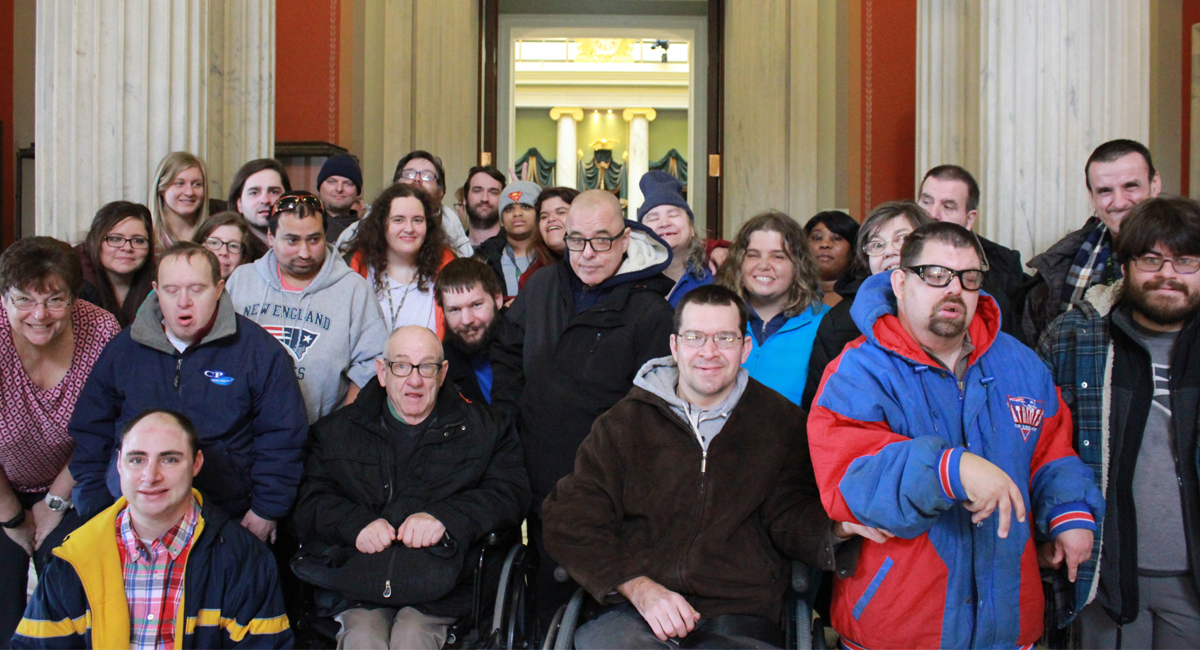
19 Years Later: A Look Back at Olmstead
By Sara Porcaro | June 26, 2018
In every era of American history, there have been new laws written, new changes to our cultural fabric, with the aim of improving life for all citizens. However, change does not happen overnight. This June, we're celebrating the 19th anniversary of the Olmstead v. L.C. Supreme Court decision, a crucial event that took place nine years after the Americans with Disabilities Act (ADA) was passed--and a monumental step forward for solidifying the rights and promise of change that the ADA set forward!
The Olmstead case was one that reaffirmed Title II of the ADA: the portion stating that no individual with disabilities could face discrimination by state and local governments. Such were the grounds that brought this case to the Supreme Court, as the plaintiffs, Lois Curtis and Elaine Wilson, were suing for being denied community-based services by the state of Georgia despite doctor's recommendation. From this court case came the decision: individuals with disabilities cannot be unjustly institutionalized.
But as it took nine years for this case to be heard and decided, it took more years still for states across America to truly comply. One of the largest barriers to full implementation, naturally, was funding. Through Medicaid, individuals with disabilities receive long term services and supports (LTSS), as well as community-based or home-based supports (HCBS). However, HCBS services were optional for states to provide under Medicaid, resulting in a waiver system that capped enrollment for services and led to individuals staying on waiting lists for over two years.
So the country had an honorable decision, but no immediate solution in sight for all the problems states encountered in enforcing it until 2009. President Obama commemorated the Olmstead decision's 10th anniversary by increasing funding for independent living centers, bringing new support for community integration, and directing the U.S. Department of Justice to actively fight on behalf of individuals still underserved in their home states. Over half of the states in the country came under fire in the courts for their inability to adhere to the Olmstead decision--and Rhode Island was one of them.
In 2013, the DOJ began investigating Rhode Island for its over-use of segregated settings, namely sheltered workshops. Two individuals affected by this issue were Gio Mazariegos and John Warburton, who are now supported by Perspectives Corporation. Before the DOJ's Consent Decree, demanding that Rhode Island allocate more funds to integrated employment programs, Gio and John were separated from their peers in school into sheltered workshops, where they and others earned as little as fifty cents an hour.
But with the Consent Decree, and more funding for integrated employment, Gio and John are now hard at work--Gio at the Elmwood Health Center's kitchen, and John at Walmart, where they thrive with their coworkers and enjoy fulfilling, competitive work. And with greater financial freedom, Gio and John are afforded the ability to do things they really enjoy: whether that be John going on vacation or Gio treating his mother to a Guns N' Roses concert, these two individuals are living life to the fullest and becoming more independent every day through integrated employment. For more information on Gio and John's Olmstead story, as well as other stories from our fellow Rhode Islanders, click here.
Progress isn't always easy, nor are transitions always smooth. But where there's support, advocacy, and persistence, change is inevitable. And while the work of activists is never over, this June, it's worth looking back for a moment and celebrating how far we've come. Nineteen years of work has brought awesome results--and it's only up from here.
The Beginning of Olmstead
The Olmstead case was one that reaffirmed Title II of the ADA: the portion stating that no individual with disabilities could face discrimination by state and local governments. Such were the grounds that brought this case to the Supreme Court, as the plaintiffs, Lois Curtis and Elaine Wilson, were suing for being denied community-based services by the state of Georgia despite doctor's recommendation. From this court case came the decision: individuals with disabilities cannot be unjustly institutionalized.
But as it took nine years for this case to be heard and decided, it took more years still for states across America to truly comply. One of the largest barriers to full implementation, naturally, was funding. Through Medicaid, individuals with disabilities receive long term services and supports (LTSS), as well as community-based or home-based supports (HCBS). However, HCBS services were optional for states to provide under Medicaid, resulting in a waiver system that capped enrollment for services and led to individuals staying on waiting lists for over two years.
So the country had an honorable decision, but no immediate solution in sight for all the problems states encountered in enforcing it until 2009. President Obama commemorated the Olmstead decision's 10th anniversary by increasing funding for independent living centers, bringing new support for community integration, and directing the U.S. Department of Justice to actively fight on behalf of individuals still underserved in their home states. Over half of the states in the country came under fire in the courts for their inability to adhere to the Olmstead decision--and Rhode Island was one of them.
Stories Close to Home
In 2013, the DOJ began investigating Rhode Island for its over-use of segregated settings, namely sheltered workshops. Two individuals affected by this issue were Gio Mazariegos and John Warburton, who are now supported by Perspectives Corporation. Before the DOJ's Consent Decree, demanding that Rhode Island allocate more funds to integrated employment programs, Gio and John were separated from their peers in school into sheltered workshops, where they and others earned as little as fifty cents an hour.
But with the Consent Decree, and more funding for integrated employment, Gio and John are now hard at work--Gio at the Elmwood Health Center's kitchen, and John at Walmart, where they thrive with their coworkers and enjoy fulfilling, competitive work. And with greater financial freedom, Gio and John are afforded the ability to do things they really enjoy: whether that be John going on vacation or Gio treating his mother to a Guns N' Roses concert, these two individuals are living life to the fullest and becoming more independent every day through integrated employment. For more information on Gio and John's Olmstead story, as well as other stories from our fellow Rhode Islanders, click here.
Progress isn't always easy, nor are transitions always smooth. But where there's support, advocacy, and persistence, change is inevitable. And while the work of activists is never over, this June, it's worth looking back for a moment and celebrating how far we've come. Nineteen years of work has brought awesome results--and it's only up from here.
APSE Member Spotlight: Adrienne Tipple, Director of Employment Services at Perspectives
November 11, 2025
A Legacy of Light: For Judy Niedbala
April 28, 2025
Celebrating a Legacy: CEO Judy Niedbala To Retire
March 21, 2025
Perspectives Holiday Project 2025
December 4, 2024
Honoring Achievements in Inclusive Employment
October 15, 2024





